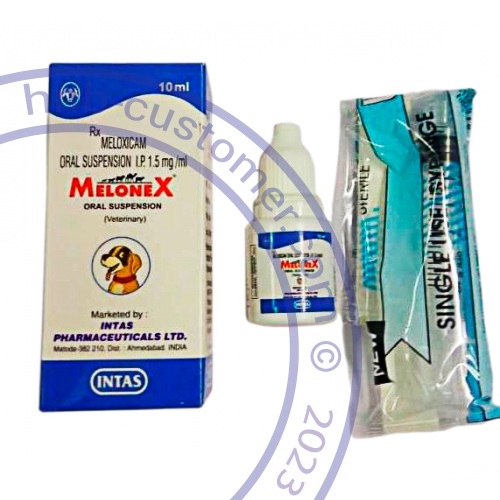Meloxicam oral Suspension®
Meloxicam
Meloxicam Oral Suspension
What is this medicine?
Meloxicam is a non-steroidal anti-inflammatory drug (NSAID) of the oxicam class which acts by inhibition of prostaglandin synthesis, thereby exerting anti-inflammatory, analgesic, anti-exudative and antipyretic effects. It reduces leukocyte infiltration into the inflamed tissue. To a minor extent it also inhibits collagen-induced thrombocyte aggregation. In vitro and in vivo studies have reported that meloxicam inhibits cyclooxygenase-2 (COX-2) to a greater extent than cyclooxygenase-1 (COX-1).
What is the composition of this medicine?
Each ml contains:
- Meloxicam BP - 1.5 mg
- Excipients - q.s
What are the indications for using this medicine?
Alleviation of inflammation and pain in both acute and chronic musculo-skeletal disorders in dogs.
Dosage information
Metaflam oral suspension can be given using dropper bottle: Four drops for each kilogram of bodyweight on the first day and two drops for each kilogram of bodyweight daily as maintenance dose.
What should I check or know before using this medicine?
Before you begin using this medication, ensure your vet is aware if the dog is pregnant or nursing pups, has any allergies, suffers from any other illnesses or health conditions, or is using any other medication or supplements.
What side effects may I notice from this medicine?
In most cases, adverse effects were transient and disappeared after termination of treatment. In rare cases however, death has been associated with some of these adverse reactions.
The following suspected adverse effects have been reported:
- Gastrointestinal: Vomiting, diarrhea, inappetence, melena, hematemesis, ulceration.
- Central Nervous System/Behavioral: Ataxia, seizures, sleepiness, hyperactivity, depression, trembling.
- Renal: Elevated creatinine and BUN, acute renal failure.
- Dermatologic: Pruritus, eczema, focal alopecia, moist dermatitis (hot spots).
- Hypersensitivity: Urticaria, allergic dermatitis.
- Hematologic: Immune mediated hemolytic anemia, immune mediated thrombocytopenia.
- Hepatic: Elevated liver enzymes, jaundice.
Meloxicam, like other drugs of its class, is not free from adverse reactions. Owners should be advised of the potential for adverse reactions and be informed of the clinical signs associated with drug intolerance. Adverse reactions may include vomiting, diarrhea, decreased appetite, dark or tarry stools, increased water consumption, increased urination, pale gums due to anemia, yellowing of gums, skin or white of the eye due to jaundice, lethargy, incoordination, seizure, or behavioral changes. Serious adverse reactions associated with this drug class can occur without warning and in rare situations result in death (see Adverse Reactions). Owners should be advised to discontinue meloxicam and contact their veterinarian immediately if signs of intolerance are observed. The vast majority of patients with drug related adverse reactions have recovered when the signs are recognized; the drug is withdrawn and veterinary care if appropriate is initiated. Owners should be advised of the importance of periodic follow up for all dogs during administration of any NSAID.
Warnings and Precautions
Repeated use of meloxicam in cats has been associated with acute renal failure and death. Do not administer additional injectable or oral meloxicam to cats. This medicine is for oral use in dogs only.
Not for use in humans. Keep out of reach of children. Consult a physician in case of accidental ingestion by humans. For oral use in dogs only. As with any NSAID all dogs should undergo a thorough history and physical examination before the initiation of NSAID therapy.
Dogs with known hypersensitivity to meloxicam should not receive meloxicam oral suspension. Do not use in cats. Appropriate laboratory testing to establish hematological and serum biochemical baseline data is recommended prior to and periodically during administration. Owner should be advised to observe their dog for signs of potential drug toxicity and be given client information sheet about meloxicam.
All dogs should undergo a thorough history and physical examination before initiation of NSAID therapy. Appropriate laboratory tests to establish hematological and serum biochemical baseline data prior to, and periodically during, administration of any NSAID should be considered.
The safe use of meloxicam oral suspension in dogs younger than 6 months of age, dogs used for breeding, or in pregnant or lactating bitches has not been evaluated. Meloxicam is not recommended for use in dogs with bleeding disorders, as safety has not been established in dogs with these disorders. As a class, cyclooxygenase inhibitory NSAIDs may be associated with gastrointestinal, renal and hepatic toxicity. Sensitivity to drug associated adverse events varies with the individual patient. Patients at greatest risk for renal toxicity are those that are dehydrated, on concomitant diuretic therapy, or those with existing renal, cardiovascular, and/or hepatic dysfunction. Concurrent administration of potentially nephrotoxic drugs should be carefully approached. Since many NSAIDs possess the potential to produce gastrointestinal ulceration, concomitant use of meloxicam oral suspension with other anti-inflammatory drugs, such as NSAIDs or corticosteroids, should be avoided or closely monitored. Consider appropriate washout times when switching from corticosteroid use or from one NSAID to another in dogs. The use of concomitantly protein-bound drugs with meloxicam oral suspension has not been studied in dogs. Commonly used protein-bound drugs include cardiac, anticonvulsant and behavioral medications. The influence of concomitant drugs that may inhibit metabolism of meloxicam oral suspension has not been evaluated. Drug compatibility should be monitored in patients requiring adjunctive therapy.
Where can I keep this medicine?
Store below 30 degree Celsius, protected from direct sunlight.













